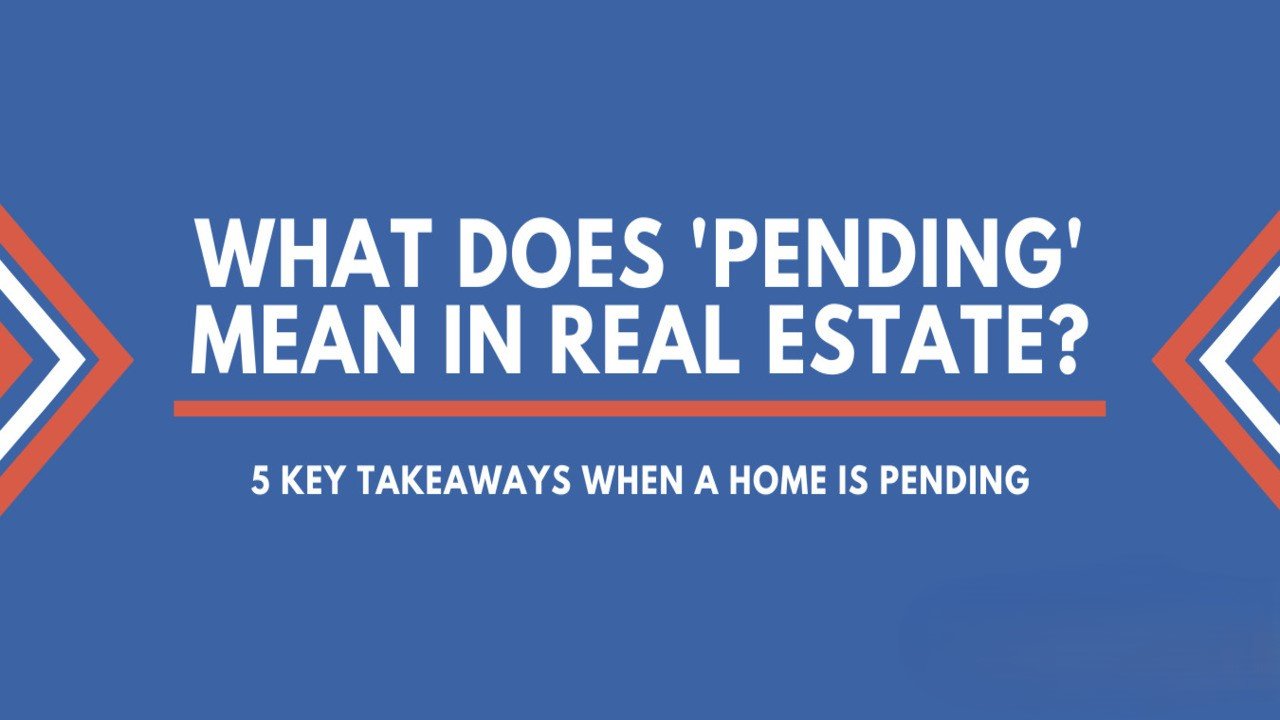What Does Pending Mean in Real Estate? Guide 2025
Ever scroll through home listings and see that status update from ‘Active’ to ‘Pending’? It’s a common point of confusion for both buyers and sellers. What does it actually mean when a house is pending? It’s a big step, but not quite the finish line. Let’s break down what ‘pending’ signifies in the real estate world and what you need to know if you’re buying or selling.
Thank you for reading this post, don't forget to subscribe!What Does Pending Mean in Real Estate Key Takeaways
- When a home listing is ‘Pending,’ it means the seller has accepted a buyer’s offer, and most or all of the initial conditions, like inspections and financing, have been met or are being finalized.
- While ‘Pending’ means the sale is very likely to go through, it’s not a guarantee until the closing papers are signed.
- As a buyer, you can still try to make an offer on a ‘Pending’ home, often as a backup, in case the primary deal falls apart.
- Sellers should continue to fulfill their obligations and may still choose to market the property or accept backup offers while a listing is ‘Pending.’
- Different ‘Pending’ statuses, like ‘Pending Continue to Show’ or ‘Pending Taking Backups,’ offer more insight into the seller’s willingness to consider other offers while the primary sale is in progress.
Understanding the ‘Pending’ Status in Real Estate
So, you’re scrolling through listings, and you see it: “Pending.” What does that actually mean for you, whether you’re trying to buy or sell? It’s a common term, but it’s not quite the same as “Sold.” Think of it as the home’s in-between stage, where the major paperwork is done, but the final handshake hasn’t happened yet.
What Does Pending Mean in Real Estate Truly Signify?
When a house is listed as “Pending,” it means the seller has accepted an offer from a buyer. This isn’t just a casual agreement; it’s a formal contract. Both parties have agreed on the price, the closing date, and importantly, any conditions attached to the sale have been met or waived. This is a big step because it means the property is well on its way to being sold. It’s a much stronger position than “Contingent,” where conditions still need to be sorted out.
The Transition from Active to Pending
Properties usually start as “Active” listings. Once a buyer makes an offer and the seller accepts it, the status might change to “Contingent” if there are still conditions to fulfill, like a home inspection or mortgage approval. After those conditions are met, the listing is updated to “Pending.” This transition shows progress and that the deal is moving forward smoothly. It’s like going from “engaged” to “married” – the commitment is there, but the final ceremony is still to come.
Key Characteristics of a Pending Listing
What can you expect when a home is pending?
- Less Marketing: Typically, the seller stops actively marketing the property. They’ve found a buyer they’re happy with and are focusing on getting the deal closed.
- Moving Towards Closing: The sale is in the final stages. This usually involves the escrow process, title searches, and final loan approvals.
- Not Quite Sold Yet: While it’s very likely to sell, it’s not a done deal. Unexpected issues can still pop up, though it’s not super common.
It’s important to remember that even though a listing is ‘pending,’ it’s not completely finalized. Some unforeseen issues can still arise before closing. For example, there might be a last-minute problem with the title, or the buyer might experience a sudden change in their financial situation. However, these types of issues are relatively rare.
Navigating Pending Sales as a Buyer
So, you’ve found the perfect house, the one that just feels right. You check the listing, and there it is: ‘Pending.’ It can feel like a punch to the gut, seeing your dream home seemingly snatched away. But don’t pack up your disappointment just yet. A ‘pending’ status means the seller has accepted an offer, and the deal is moving towards closing, but it’s not a done deal until the ink is dry.
What ‘Pending’ Means for Your Home Search
When a property is listed as ‘pending,’ it generally means the seller has accepted an offer, and most, if not all, of the initial hurdles like inspections and appraisals have been cleared. The sale is now in the final stages, often involving the lender finalizing the buyer’s mortgage and preparing for the closing. This status usually indicates a higher likelihood of the sale going through compared to a ‘contingent’ status, where major conditions are still pending.
Can You Still Make an Offer on a Pending Home?
Technically, yes, you can still try to submit an offer on a home that’s already pending. However, the chances of it being accepted are slim unless the original deal falls apart. Some sellers, especially if they want to cover their bases, might agree to consider backup offers. This is more likely if the listing has a specific ‘Pending – Taking Backups’ status. If you’re serious about a pending property, talk to your real estate agent about expressing your interest and potentially submitting a backup offer. It’s a long shot, but sometimes, that’s how deals happen.
Staying Informed on Pending Transactions
Even though a home is pending, it’s wise to stay in the loop, especially if you’ve been actively looking in that area or had your eye on that specific property. Deals can, and sometimes do, fall through. Reasons vary, but common issues include last-minute financing problems for the buyer or unexpected findings during a final walkthrough. According to a Zillow survey, about 40% of failed deals were due to money or financing issues. While only a small percentage of pending sales don’t close (estimates suggest around 5%), knowing this can help manage expectations. If a pending sale does fall through, the property will typically revert to ‘Active’ status, and you’ll want to be ready to act fast.
Here’s a quick look at why deals might not close:
- Financing Issues: The buyer’s loan approval might fall through.
- Inspection Problems: Significant issues found during the inspection might not be resolved.
- Appraisal Gaps: The home’s appraised value might be lower than the agreed-upon sale price.
- Title Issues: Problems with the property’s title can arise.
While a ‘pending’ status is a strong indicator that a sale is likely to close, it’s not a guarantee. Buyers should remain patient and continue their home search until a sale is officially marked as ‘Sold.’
Seller’s Perspective on a Pending Sale

So, your house is finally under contract. That ‘pending’ status on the listing? It feels like a huge relief, right? You’ve navigated showings, negotiations, and finally got an offer accepted. But hold on, it’s not quite ‘sold’ yet. Think of ‘pending’ as the home stretch, where all the major hurdles are cleared, but there are still a few things to manage before you hand over the keys.
Moving Towards Closing
Once a sale hits ‘pending,’ it means the buyer’s contingencies, like financing and inspection, have been satisfied. This is a really good sign. The buyer has likely secured their loan, the inspection didn’t uncover any deal-breakers, and the appraisal came in at or above the agreed-upon price. Your agent will be working closely with the buyer’s agent and the title company to get all the paperwork in order. This involves things like title searches, deed preparation, and coordinating the final walkthrough. It’s a period of intense administrative activity, all aimed at getting to the closing table smoothly.
Continuing Marketing Efforts
Even though your home is pending, it’s often wise to keep it on the market, at least unofficially. Why? Because deals can, and sometimes do, fall through. It’s rare, but it happens. Maybe the buyer’s financing hits a snag at the last minute, or a major issue pops up during the final walkthrough. If your listing is still visible and you’re open to backup offers, you’ve got a potential safety net. This means having your agent ready to present any new offers that come in, should the current deal collapse. It’s a bit like having insurance for your sale.
The Importance of Fulfilling Obligations
What Does Pending Mean in Real Estate? As the seller, you have specific responsibilities to ensure the sale goes through. This means:
- Cooperating with the buyer’s requests: This could include allowing access for the final walkthrough or providing any necessary documentation.
- Addressing any agreed-upon repairs: If the inspection revealed minor issues that you agreed to fix, make sure those are completed as promised.
- Clearing the title: Work with your title company to resolve any liens or encumbrances on the property.
- Preparing for the closing: Ensure all your personal belongings are removed and the property is clean and ready for the new owners.
It’s crucial to maintain clear communication with your real estate agent throughout the pending period. They are your primary point of contact for managing expectations and addressing any issues that may arise. Staying proactive and responsive can make a significant difference in a smooth transaction.
While the ‘pending’ status is a strong indicator that the sale will close, it’s not the absolute end. Staying diligent and prepared will help ensure you reach that final ‘sold’ status without any last-minute surprises.
Common Variations of Pending Status
So, you’ve seen a house you like, and it’s listed as ‘pending.’ That’s a big step from ‘active,’ but not quite ‘sold’ yet. It means the seller has accepted an offer, and things are moving towards closing. However, not all ‘pending’ statuses are created equal. There are a few common variations that can give you a clearer picture of where the deal stands.
Pending Continue to Show (PCS)
This is a status where the seller has accepted an offer, but they’re still open to showing the property to other potential buyers. Why would they do this? Usually, it’s because the accepted offer has some contingencies that haven’t been met yet. The seller is essentially keeping their options open in case the primary deal falls through. For buyers, this means there’s still a slim chance to get your foot in the door, but you’ll likely be considered a backup offer.
Pending Taking Backups
Similar to PCS, ‘Pending Taking Backups’ means the seller has an accepted offer, but they are actively encouraging and accepting backup offers. This is a more direct way for sellers to ensure they have another interested party ready to go if the first sale doesn’t make it to the closing table. If you’re interested in a home with this status, your agent can submit a backup offer, and you’ll be next in line if the original buyer can’t complete the purchase.
Pending Short Sale
A ‘Pending Short Sale’ status indicates a more complex situation. In a short sale, the seller owes more on their mortgage than the property is currently worth. This means the lender has to approve the sale price, which can add significant time and uncertainty to the process.
Here’s a quick look at what that might involve:
- Lender Approval: The lender must agree to accept less than the full amount owed on the mortgage.
- Extended Timeline: The approval process can take weeks or even months, delaying the closing.
- Potential for Failure: There’s a higher chance the deal might not go through if the lender doesn’t approve the terms.
Dealing with a short sale can be a waiting game. Patience is key for both buyers and sellers involved in these types of transactions.
It’s important to remember that even with a ‘pending’ status, the sale isn’t guaranteed. While about 5% of pending offers fall through according to National Association of Realtors data, understanding these variations helps you know what to expect and how to proceed. If you’re interested in a property that’s pending, always discuss the specific status with your real estate agent to understand the likelihood of the deal closing and whether backup offers are being considered. You can find more information on what a pending status means on Priority 1 Lending.
The Role of Contingencies in Pending Sales

Satisfied Contingencies Pave the Way
When a home moves from ‘active’ to ‘contingent’ and then to ‘pending,’ it’s because certain conditions, called contingencies, have been met. Think of these as checkpoints. The buyer and seller agree on these conditions before the sale really gets serious. For buyers, these are super important safety nets. They mean the deal isn’t a done deal until things like a satisfactory home inspection, a decent appraisal, and securing the necessary mortgage funds are all confirmed. Once all these agreed-upon contingencies are cleared, the sale officially moves into the ‘pending’ status, signaling a much higher likelihood of closing. It means the buyer has done their due diligence and is committed, and the seller can feel more confident that the sale will go through.
Common Contingencies Addressed
What Does Pending Mean in Real Estate? Several common conditions often need to be satisfied before a sale becomes pending. Here are a few you’ll see frequently:
- Financing Contingency: This ensures the buyer can actually get the loan they need to buy the house. If they can’t secure the mortgage, they can back out without losing their deposit.
- Inspection Contingency: Buyers usually want a professional to check out the home’s condition. If major issues pop up that weren’t expected, they can renegotiate the price or walk away.
- Appraisal Contingency: Lenders require an appraisal to make sure the home is worth the loan amount. If the appraisal comes in lower than the agreed-upon price, the buyer might need to bring more cash to the table or renegotiate.
- Home Sale Contingency: Sometimes, a buyer needs to sell their current home before they can buy a new one. This makes the purchase dependent on their existing home selling within a specific timeframe.
Contingencies and Deal Certainty
Contingencies are what separate a ‘maybe’ from a ‘very likely.’ While it’s true that even in a pending status, deals can sometimes fall apart (about 5% of pending offers don’t close, often due to financing issues), the presence of satisfied contingencies significantly reduces that risk. For buyers, these conditions are their protection. For sellers, seeing contingencies met means the buyer is serious and has done the necessary work to move forward. It’s a sign that the transaction is progressing smoothly towards the final handshake.
The number of contingencies and the specific terms agreed upon can greatly influence how quickly a sale moves to pending and the overall certainty of the transaction. Each contingency represents a potential hurdle that must be cleared for the deal to proceed.
Why Homes Remain ‘Pending’ and Not ‘Sold’
So, you see a house you like, and the status is ‘Pending.’ What does that really mean? It means the seller has accepted an offer, and things are moving forward, but the ink isn’t quite dry yet. It’s like being at the airport, checked in and through security, but still waiting for boarding. The deal is very likely to go through, but there are still a few steps before it’s officially a done deal.
The Final Stages Before Closing
Once a home is ‘Pending,’ it means the buyer and seller have agreed on terms, and most of the major hurdles, like inspections and initial loan approvals, have been cleared. The property is now in the escrow or closing process. This involves a lot of paperwork, title searches, and final loan underwriting. Think of it as the administrative marathon before crossing the finish line. The ‘Pending’ status signifies that the transaction is in its final administrative stages.
Potential Roadblocks to Finalization
Even at the ‘Pending’ stage, things can sometimes go sideways. It’s not common, but it happens. Here are a few reasons why a pending sale might not make it to ‘Sold’:
- Financing Issues: While the buyer likely has initial loan approval, a last-minute problem with their lender, like a change in their financial situation or an issue with the appraisal, can derail the sale.
- Title Problems: Sometimes, a title search can uncover unexpected issues, such as liens or ownership disputes, that need to be resolved before the sale can proceed.
- Unforeseen Circumstances: Life happens. A buyer might face a job loss or a personal emergency that prevents them from completing the purchase.
- Inspection Discrepancies: While major inspection issues are usually handled before the ‘Pending’ status, sometimes minor issues can arise that require renegotiation.
The Likelihood of Pending Deals Falling Through
It’s natural to wonder how often these deals actually fall apart. While statistics can vary by market, generally, the percentage of pending sales that don’t close is quite low. For instance, data suggests that typically less than 5% of pending offers might not go through to closing. However, it’s important to remember that this is an average, and specific circumstances can influence this number. For sellers, this is why some might still accept backup offers, just in case.
While ‘Pending’ is a strong indicator that a sale is on track, it’s not a guarantee. Both buyers and sellers should remain prepared for potential, albeit infrequent, complications during this final phase.
Wrapping Up the ‘Pending’ Process
So, we’ve broken down what ‘pending’ really means in the world of real estate. It’s that stage after an offer is accepted but before the ink is totally dry. While it signals things are moving along nicely, it’s not quite a done deal yet. For buyers, it might mean a bit of waiting and watching, and for sellers, it’s about staying organized and prepared for the final steps. Understanding these different statuses, like ‘pending continue to show’ or ‘pending taking backups,’ can really help manage expectations. Ultimately, knowing where a property stands in the process helps everyone involved move forward with a clearer picture. It’s all part of the journey to getting that house sold or finding that perfect new home.
Frequently Asked Questions
What does ‘pending’ really mean when buying or selling a house?
When a house is ‘pending,’ it means the seller has accepted an offer from a buyer. Think of it as being in the final stages before the sale is official. Most of the big steps, like getting a loan and having the house inspected, are done. It’s very close to being sold, but not quite there yet.
Can I still offer on a house that is listed as ‘pending’?
You technically can still make an offer, but it’s usually a long shot. Sometimes sellers will consider backup offers in case the first deal doesn’t go through. It’s best to talk to your real estate agent about whether making a backup offer makes sense for a pending property.
What’s the difference between ‘contingent’ and ‘pending’?
A ‘contingent’ status means the seller accepted an offer, but there are still important conditions (like a home inspection or loan approval) that need to be met. ‘Pending’ usually means those conditions have been met, and the sale is much closer to being finalized. It’s a step further along than ‘contingent’.
Why do some ‘pending’ listings say ‘Continue to Show’?
If a listing is ‘Pending Continue to Show,’ it means the seller has accepted an offer, but they are still open to showing the house to other potential buyers. This often happens when there are still a few conditions to be met, and the seller wants to be prepared in case the first deal falls apart.
What are common reasons a ‘pending’ sale might fall through?
Even when a sale is ‘pending,’ things can sometimes go wrong. Common issues include problems with financing, the buyer not getting approved for a loan, or the house not appraising for the agreed-upon price. These situations are less common but can happen.
As a seller, what should I do when my house is ‘pending’?
When your house is pending, you should work closely with your agent to make sure all the final paperwork and steps are completed smoothly. While the deal is likely to go through, it’s still important to be prepared for any last-minute issues and fulfill your part of the agreement to ensure the sale closes successfully.













